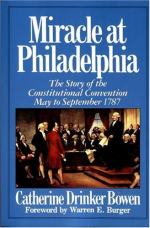
|
| Name: _________________________ | Period: ___________________ |
This test consists of 15 multiple choice questions and 5 short answer questions.
Multiple Choice Questions
1. Which delegate is credited with being the strongest influence on the creation of the 1787 Convention?
(a) Rufus King.
(b) Alexander Hamilton.
(c) Patrick Henry.
(d) John Adams.
2. In Chapter Four, what issue does James Wilson see as the heart of the problem surrounding government?
(a) Does it represent all states equally?
(b) Is it be over men or over states?
(c) Is it modeled after the British form of government?
(d) Is it be decided at the Convention?
3. In Chapter 10, the delegates vote that senators are chosen by whom?
(a) Members of Congress.
(b) State legislatures.
(c) Citizens in a popular vote.
(d) The Chief Executive.
4. Which delegate from South Carolina claims to have a plan similar to that presented by Edmund Randolph?
(a) James Madison.
(b) Elbridge Gerry.
(c) John Adams.
(d) Charles Pinkney.
5. Why does Patterson of New Jersey ask for time in mid June?
(a) To develop and gather support for an alternative to the Virginia Plan.
(b) To return home and take care of his family.
(c) To discuss Convention matters with other delegates from his state.
(d) To prepare a draft of the Constitution for the Committee of the Whole.
6. What forms the basis of the Convention's procedure?
(a) The Magna Carta.
(b) The Virginia Resolves.
(c) The Articles of Confederation.
(d) The Pennsylvania Constitution.
7. What is the first resolution of the New Jersey Plan?
(a) That a national government is established with a supreme legislative, judicial, and executive branches.
(b) That all states have equal representation in Congress.
(c) That the Articles of Confederation are revised to make the federal Constitution adequate.
(d) That a single executive governs the country.
8. Who is Guillaume Penn?
(a) The founder of the Pennsylvania Quakers, admired by the French.
(b) A French statesman who lives in Pennsylvania.
(c) A member of the Pennsylvania Congress who favors trade with the French.
(d) The founder of a French religious colony in Pennsylvania.
9. What is the function of the Committee of the Whole House?
(a) To maintain an accurate record of all the issues being discussed.
(b) To give delegates the chance to gather in smaller groups to discuss issues.
(c) To vote on the Virginia Resolves.
(d) To allow delegates a chance to discuss issues without being bound to their opinion.
10. Which delegate took the most comprehensive notes on the Convention meeting?
(a) Morris.
(b) Madison.
(c) Franklin.
(d) Washington.
11. A motion on which issue opens the discussion on June 20th?
(a) A motion to choose between the New Jersey and Virginia Plans.
(b) A motion on how senators are chosen.
(c) A motion to allow Congress to have two branches.
(d) A motion to remove "national" from the first Virginia Resolve.
12. How does Washington get his title of Commander in Chief?
(a) Washington is appointed as the Commander of the thirteen original colonies.
(b) Washington is elected the Commander of the Convention.
(c) A popular vote elects him as General of the Continental Army.
(d) Congress elects him as General of the Continental Army.
13. When they arrive, what is the most immediate problem for convention delegates?
(a) Electing a President.
(b) Personal funding, because city life is expensive.
(c) Earning re-election in their home districts.
(d) Finding a place to stay, because Philadelphia is very crowded.
14. Who is Edmund Randolph?
(a) Governor of New Jersey.
(b) Governor of Virginia.
(c) Governor of New Hampshire.
(d) Governor of New York.
15. Why is it difficult for Congress to obtain a quorum?
(a) Congress members prefer state interests to general government interests.
(b) Congress members disagree with the way the government is working after the Revolutionary War.
(c) Congress members have other jobs that prohibit their participation in Congress.
(d) Congress members do not have enough money to travel to meetings.
Short Answer Questions
1. In Chapter Five, what situation does Madison feel is "peculiarly embarrassing"?
2. Which delegate is beloved by the French?
3. Which American food does Brissot de Warville describe as food for the man who wants to be free?
4. What type of government does Virginia's George Wythe support?
5. What does Madison consider to be the usefulness of the Senate?
|
This section contains 772 words (approx. 3 pages at 300 words per page) |

|




